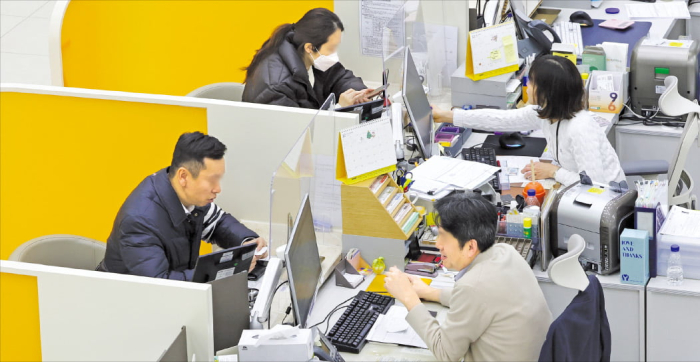Economy
Korea’s household debt hits record high on mortage loans
Mortgage loans make up 61.4% of household lending as of the end of June amid the housing market recovery
By Aug 20, 2024 (Gmt+09:00)
2
Min read
Most Read
LG Chem to sell water filter business to Glenwood PE for $692 million


KT&G eyes overseas M&A after rejecting activist fund's offer


Kyobo Life poised to buy Japan’s SBI Group-owned savings bank


StockX in merger talks with Naver’s online reseller Kream


Meritz backs half of ex-manager’s $210 mn hedge fund



South Korea’s household debt hit a record high in the second quarter as the domestic housing market started to recover and more consumers rushed to take out loans for investments.
The balance of household credit increased 0.7% from the end of April to reach 1,896.2 trillion won ($1.42 trillion) at the end of June, the highest record since the data began to be collected in the fourth quarter of 2002, the Bank of Korea (BOK) said on Tuesday.
The data on household credit includes lending from financial institutions such as banks, savings banks, insurers, and consumers’ credit card pre-authorization.
The quarterly balance continued to increase from the second to the fourth quarter of last year. It declined by 0.2% in the first quarter and rose again in the second quarter of this year.
The balance of household lending alone, excluding credit card spending, rose 0.8% or 13.5 trillion won to 1,780 trillion won in the second quarter.
Mortgage loans, making up 61.4% of the household lending, increased 1.5% to 1,092.7 trillion won.
Household lending other than mortgage loans, or consumer credit, has been on a downward trend for 11 consecutive quarters and declined 0.4% to 687.2 trillion won in the second quarter. The cut in the second quarter, or 2.5 trillion won, was only 19% of the decline in the first quarter.
“The balance of household credit rose in the April-June period due to a larger increase in mortgage loans, which was led by housing transaction growth in the Seoul metropolitan region, and a smaller decrease in consumer credit,” a BOK official said.
The number of units transacted in the housing market increased 23% to 171,000 in the second quarter. In the first quarter, the figure increased 6.1% to 139,000.
“Housing transactions affect household lending with a two- to three-month lag,” the central bank official said. “The BOK and other authorities are closely monitoring the housing market as household debt increased in July at a similar pace in the second quarter,” the official added.
The central bank will review the effect of government policies on the housing market, such as stricter rules on bank’s household loans, and expansion of housing supply in the capital and Seoul metropolitan area, the official said.
Write to Jin-gyu Kang at josep@hankyung.com
Jihyun Kim edited this article.
More to Read
-
 EconomyS.Korea’s July household debt grows at fastest pace in over 3 years
EconomyS.Korea’s July household debt grows at fastest pace in over 3 yearsAug 01, 2024 (Gmt+09:00)
2 Min read -
 EconomyKorea’s household debt growth at 5-month high on mortgages
EconomyKorea’s household debt growth at 5-month high on mortgagesMay 13, 2024 (Gmt+09:00)
2 Min read -
 Central bankBOK chief’s top mission: Soft landing for household debt
Central bankBOK chief’s top mission: Soft landing for household debtAug 24, 2023 (Gmt+09:00)
2 Min read -
 EconomyAverage household debt in South Korea exceeds $69,000 so far this year
EconomyAverage household debt in South Korea exceeds $69,000 so far this yearDec 01, 2022 (Gmt+09:00)
2 Min read
Comment 0
LOG IN


